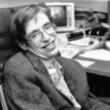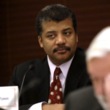The End of Everything: (Astrophysically Speaking)
(Libby/OverDrive eBook, Kindle)
Available Platforms
Description
More Details
Excerpt
Similar Titles From NoveList
Similar Authors From NoveList
Published Reviews
Choice Review
While prolific in writing cosmology articles for a general readership, with publications in, e.g., Astronomy (magazine), Scientific American, and the like, author Mack (currently assistant professor at North Carolina State Univ.) delivers her first full-length book relying on the cosmology and astrophysics she learned at Caltech and Princeton and that she knows so well. As the title suggests, Mack focuses on several theories concerned with the end of the universe as we know it. Casual readers of popular cosmology will not be surprised to reencounter the Big Bang, the universe which expands forever, a universe that ends in a heat death, and the cyclic (or bouncing) universe as found in chapters 2, 3, 4, and 7. Yet surprisingly, Dr. Mack reworks these well-known theories, introducing new research (some of it her own), effectively updating readers in an entertaining and humorous style likely to captivate even practiced readers from the prologue to the epilogue. In addition, she introduces two novel theories in chapters 5 and 6: "The Big Rip" and "Vacuum Decay." Mack has an uncanny talent for pausing during her expositions to clarify sticky details that many authors might gloss over, such as how far-away galaxies might actually be receding from us at faster-than-light speed. Summing Up: Highly recommended. Lower- and upper-division undergraduates. Students in two-year technical programs. General readers. --James F. Burkhart, emeritus, University of Colorado at Colorado Springs
Publisher's Weekly Review
Mack, a theoretical astrophysicist who has written for Scientific American and Cosmos, debuts with a fascinating tour of the cosmic forces--quantum vacuums, dark matter, dark energy, entropy, and gravitation among them--that may conspire to end the universe. Excelling at providing just enough scientific detail, Mack sets the scene with an exceptionally lucid history of the universe from the big bang to the present. As to how the end might occur, Mack reveals a surprising number of competing theories, including that the mysterious dark energy will rip the cosmos apart, or, conversely, that the universe will collapse in on itself. In the currently most favored theory, it will be the victim of entropy, a long, cold demise paradoxically named "heat death," and in another scenario, which could happen at any moment, the all-pervading Higgs energy field will become unstable. (In this eventuality, Mack is careful to assure readers, the process will be painless and instantaneous.) In outlining the reasoning behind each theory, she also acknowledges opposing arguments and provides context for how astrophysicists found the supporting data. Despite the seemingly frightening topic, Mack's endlessly entertaining survey is infused with a palpable love of her subject, and will transmit to readers the same joy she finds in exploring the wide and fascinating universe. Agent: Mollie Glick, CAA. (Aug.)
Library Journal Review
As theoretical astrophysicist Mack (physics, North Carolina St. Univ.) notes, while the universe we know will probably end, scientists cannot agree on the details of its demise. A formerly proposed Big Crunch is not supported by current evidence; Heat Death, Big Rip, and the Bounce are still considered possible. Vacuum Decay could even occur in the next minute, obliterating everything else that exists. The irreverent names are not Mack's creations, but fit perfectly with her frequent, playful asides about physics and physicists as she describes how much we still need to learn about the cosmos. Although the author's expertise as a science communicator is evident throughout, at times the complexity of topics requires her to oversimplify and acknowledge that readers may lack sufficient knowledge of math and physics to best understand a particular phenomenon. VERDICT Readers with some background in physical sciences, philosophers of science, and anyone wondering what to read after Brian Greene's Until the End of Time will relish this blend of wit and deep thought.--Nancy R. Curtis, Univ. of Maine Lib., Orono
Kirkus Book Review
A theoretical astrophysicist surveys five possible scenarios for the end of the universe, backed by the latest research in physics and cosmology. Acknowledging the end of the universe is a grim proposition. But after accepting the fact that our universe cannot "persist unchanged, forever," thinking through the science of end times is actually a thrill, an opportunity "to dig deep into the question of where it's all going, what that all means, and what we can learn about the universe we live in by asking these questions." Mack uses humor, metaphor, and personal experience to offset her often technical descriptions, creating a delightfully unsettling narrative that explains big ideas in modern physics and cosmology through the lens of end times. "Whether or not the world is falling apart from a political perspective," she writes, "scientifically, we're living in a golden age. In physics, recent discoveries and new technological and theoretical tools are allowing us to make leaps that were previously impossible…the scientific exploration of how the universe might end is just now undergoing its renaissance." In accessible yet precise language, Mack details how these modern scientific approaches suggest five apocalyptic scenarios: the Big Crunch, Heat Death, the Big Rip, Vacuum Decay, and the Bounce. Each is creative in its demise, giving the author an excuse to expound on the latest theories about dark energy and the expanding universe, the Higgs boson, and the multiverse. She celebrates that the near future will be filled with knowledge and discovery, even if the far future is doomed. "Work on the cutting edge of physics is already pointing us toward a universe far stranger than we even could have imagined," she writes. Drawing on the wisdom of a variety of pioneering physicists, the author delivers a sleek narrative of discovery. Mack's pleasing writing style makes speculating about the death of the universe unexpectedly entertaining. (b/w illustrations) Copyright (c) Kirkus Reviews, used with permission.
Library Journal Reviews
As theoretical astrophysicist Mack (physics, North Carolina St. Univ.) notes, while the universe we know will probably end, scientists cannot agree on the details of its demise. A formerly proposed Big Crunch is not supported by current evidence; Heat Death, Big Rip, and the Bounce are still considered possible. Vacuum Decay could even occur in the next minute, obliterating everything else that exists. The irreverent names are not Mack's creations, but fit perfectly with her frequent, playful asides about physics and physicists as she describes how much we still need to learn about the cosmos. Although the author's expertise as a science communicator is evident throughout, at times the complexity of topics requires her to oversimplify and acknowledge that readers may lack sufficient knowledge of math and physics to best understand a particular phenomenon. VERDICT Readers with some background in physical sciences, philosophers of science, and anyone wondering what to read after Brian Greene's Until the End of Time will relish this blend of wit and deep thought.—Nancy R. Curtis, Univ. of Maine Lib., Orono
Copyright 2020 Library Journal.Publishers Weekly Reviews
Mack, a theoretical astrophysicist who has written for Scientific American and Cosmos, debuts with a fascinating tour of the cosmic forces—quantum vacuums, dark matter, dark energy, entropy, and gravitation among them—that may conspire to end the universe. Excelling at providing just enough scientific detail, Mack sets the scene with an exceptionally lucid history of the universe from the big bang to the present. As to how the end might occur, Mack reveals a surprising number of competing theories, including that the mysterious dark energy will rip the cosmos apart, or, conversely, that the universe will collapse in on itself. In the currently most favored theory, it will be the victim of entropy, a long, cold demise paradoxically named "heat death," and in another scenario, which could happen at any moment, the all-pervading Higgs energy field will become unstable. (In this eventuality, Mack is careful to assure readers, the process will be painless and instantaneous.) In outlining the reasoning behind each theory, she also acknowledges opposing arguments and provides context for how astrophysicists found the supporting data. Despite the seemingly frightening topic, Mack's endlessly entertaining survey is infused with a palpable love of her subject, and will transmit to readers the same joy she finds in exploring the wide and fascinating universe. Agent: Mollie Glick, CAA. (Aug.)
Copyright 2020 Publishers Weekly.Reviews from GoodReads
Citations
Mack, K. (2020). The End of Everything: (Astrophysically Speaking) . Scribner.
Chicago / Turabian - Author Date Citation, 17th Edition (style guide)Mack, Katie. 2020. The End of Everything: (Astrophysically Speaking). Scribner.
Chicago / Turabian - Humanities (Notes and Bibliography) Citation, 17th Edition (style guide)Mack, Katie. The End of Everything: (Astrophysically Speaking) Scribner, 2020.
Harvard Citation (style guide)Mack, K. (2020). The end of everything: (astrophysically speaking). Scribner.
MLA Citation, 9th Edition (style guide)Mack, Katie. The End of Everything: (Astrophysically Speaking) Scribner, 2020.
Copy Details
| Collection | Owned | Available | Number of Holds |
|---|---|---|---|
| Libby | 1 | 0 | 2 |


































